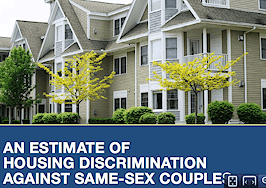Dream Town Realty has launched what it says is the first U.S. broker division tailored to consumers who identify as members of the lesbian, gay, bisexual and transgender community. The division is designed to provide resources to LGBT consumers and highlight the firm’s LGBT-friendly agents.
The Chicago-based brokerage, which has three offices and 200 agents in the area, began developing the division in response to Illinois lawmakers’ vote to make gay marriage legal in the state last November, Dream Town President Yuval Degani told Inman News.
Degani said the decision to create the division was one part advocacy and one part business. The division, launched on Friday, has its own page on the Dream Town website promoting the division’s agents, the events it sponsors and a set of resources it has collected. So far, the response to the division has been all positive, Degani said.
Given that a 2013 U.S. Housing and Urban Development study found that same-sex couples were treated less favorably than heterosexual couples when looking for rental housing online, Degani said he felt there was room for advocacy in the space.
He also felt the division could help address some of the confusion some LGBT community members may have about their new opportunity to legally wed and the real estate — and tax — implications involved by providing online resources and public events for them.
Members of Dream Town’s new LGBT division with Dream Town’s president, Yuval Degani, center.
Other real estate organizations have come out in support of gay marriage, including the 7,000-member Minneapolis Association of Realtors who publicly opposed a proposed Minnesota state constitutional amendment to recognize only marriages between opposite-sex couples in November 2012.
Currently 15 agents — all of whom identify as members of the LGBT community — serve in the division, headed by Dream Town agent Todd Szwajkowski. Though they fill the roster now, Dream Town agents don’t need to be a member of the LGBT community to be a part of the division, Szwajkowski said.
It’s not that the mechanics of the homebuying and selling process is really any different for LGBT consumers than it is for their heterosexual counterparts, Szwajkowski told Inman News. But with intimate life events — like handling what is likely to be a consumer’s most valuable asset — sometimes people want to work with those they feel most comfortable with, he said.
For example, as a gay man Szwajkowski says he feels more comfortable visiting a gay physician. The same goes, he suspects, for a portion of LGBT real estate consumers.
When a heterosexual couple works with a broker, there are a lot of assumptions made on both sides, Szwajkowski said. With a gay couple, they may not be sure of their broker’s personal or political leanings, a situation that exposes the division’s most basic utility — matching like-minded brokers and consumers with each other, he said.
One of the division’s roles will be to host events to help educate LGBT consumers about the real estate process, he said. For example, the division’s April 26 “Pride of Ownership” event will be a panel discussion on home finance options, title transfer rights and taxes.
Degani said the division’s launch happened earlier than expected, because, though Illinois lawmakers had set June 1 as the day gay marriage would be legal in the state, a federal district court judge surprisingly ruled on Feb. 21 that it should be implemented immediately in Cook County, which encompasses Chicago.












